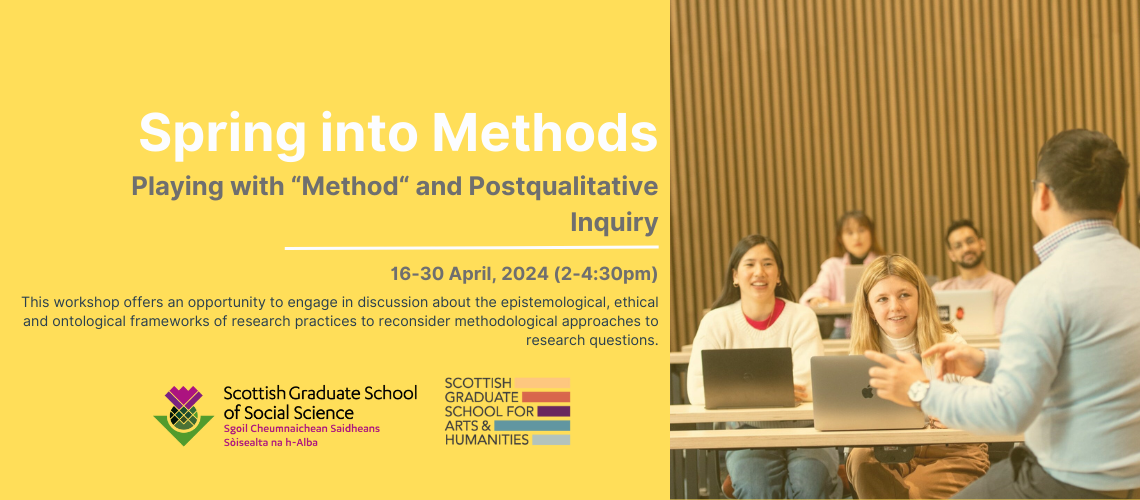This training event is geared towards 1st and 2nd year PhD students working or interested in working with posthumanist and new materialist philosophies. In three sessions, we revise the fundamentals of posthumanism and its impact on methodological designs drawing upon Elisabeth St. Pierre’s (2011, 2013) call for a postqualitative inquiry in which traditional research methods on human subjects —such as interviews, observations, codings, and other efforts to produce valid data— are dismissed in favor of more open, fluid and ethically engaged approaches that recognize the agency of data and of non-human entities. St. Pierre argues against the separation of the theoretical and the methodological, pointing out how conventional humanist qualitative methodologies do not align with the ontological proposals of postmodernism, poststructuralism, and posthumanism and calls for research that explores the radical implications the critique of representation has for methodologies that have been organised around the idea of “responsible autonomous human subjects (aka well-trained qualitative researchers)” (MacLure ‘Researching without Representation 658). Post-qualitative inquiry proposes a ‘methodology free’ approach refusing the demands of ‘application’. The workshop will, therefore, provoke questions about the agency of methods in knowledge production.
The workshop will be focused on the possible affordances of research questions inviting students to think about the questions that guide their research. Such a focus is meant to provide a possible application of postqualitative inquiry in relation to methodological practices. We will also revise the “acts of noticing” (Murris 2020) in data analysis. To produce a postqualitative inquiry, Elisabeth St. Pierre recommends putting methodology aside while reading widely across philosophy, social theories, and the history of science to find concepts that reorient thinking. The workshop is, therefore, an invitation to read and share possible orientating concepts. A month prior to the first session, the students will receive a list of possible texts to explore posthumanist philosophies. These texts will include some that make comments on possible methodological applications as well as other that give more theoretical prepositions. Each student may choose three of those texts to read prior to the first meeting. In the first session, we will work in separate and joint groups to discuss posthumanist philosophies and postqualitative inquiry and our readings of those texts. The second and third sessions will be structured around the research questions of the dissertation projects which the students will be invited to reimagine with a postqualitative approach. The research questions will lead us to discussions about the implications for methodological designs.
We will curate one set of readings before the workshop with texts about postqualitative inquiry (a few examples are included below). In the first session we will allocate time to discuss in small and larger groups about the readings and how they shift epistemological and ontological understanding of our research practices. We will invite students to use postqualitative, posthumanist and new materialist approaches to rethink the questions that guide their research approaches and/or their data analysis. We will explore what it means to be guided by an ontology of immanence and to unlearn our humanist ways of knowing. After the third session students will be invited to recommend texts —from the original list or other related texts that they have found useful and are related to the postqualitative turn— with a short note of how these have helped them to revise their research questions. These recommendations will be collected in a blog. We will also recommend a few additional literary and multimodal texts that help us to explore posthumanist ways of knowing. This resource will help students to think through their questions with postqualitative inquiry.
This workshop will be held for three sessions:
Tuesday 16 April 2024 2-4:30pm
Tuesday 23 April 2024 2-4:30pm
Tuesday 30 April 2024 2-4:30pm
Please Note:
In order to manage the volume of interest for Spring into Methods in a fair and equitable way, we ask that you submit a registration of interest form (below) to indicate you wish to participate in this workshop. Submitting a registration of interest does not automatically guarantee your place in a workshop. Once you submit your registration of interest, you will receive a confirmation email within 1 business day.
We will review all registrations of interest and we will be in touch w/c 01 April to confirm whether or not you have been allocated a place in this workshop. If you are allocated a place on the workshop, you will receive a confirmation email and event details will be sent to you ahead of the event. If you are not allocated a place in this workshop, we will email to let you know and will continue to hold your position on the wait list should a place become available.
You may submit a registration of interest for up to two Spring into Methods workshops. If you have submitted an expression of interest in another workshop, you will receive any communications about that workshop separately.


